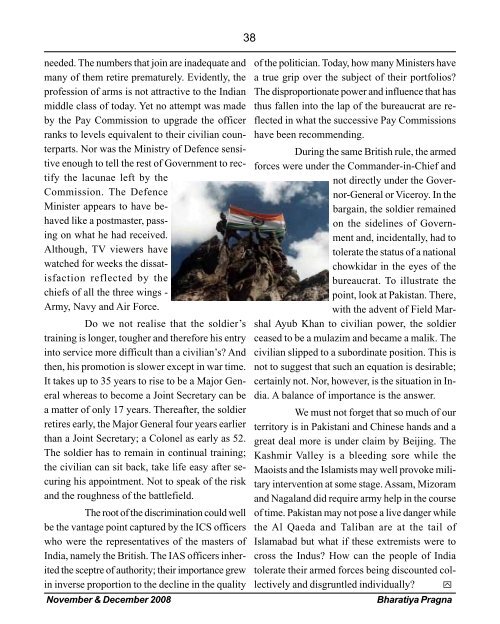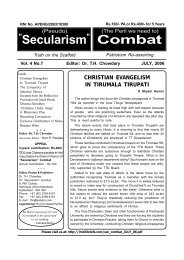Bharatiya Pragna - Dr. Th Chowdary
Bharatiya Pragna - Dr. Th Chowdary
Bharatiya Pragna - Dr. Th Chowdary
You also want an ePaper? Increase the reach of your titles
YUMPU automatically turns print PDFs into web optimized ePapers that Google loves.
needed. <strong>Th</strong>e numbers that join are inadequate and<br />
many of them retire prematurely. Evidently, the<br />
profession of arms is not attractive to the Indian<br />
middle class of today. Yet no attempt was made<br />
by the Pay Commission to upgrade the officer<br />
ranks to levels equivalent to their civilian counterparts.<br />
Nor was the Ministry of Defence sensitive<br />
enough to tell the rest of Government to rectify<br />
the lacunae left by the<br />
Commission. <strong>Th</strong>e Defence<br />
Minister appears to have behaved<br />
like a postmaster, passing<br />
on what he had received.<br />
Although, TV viewers have<br />
watched for weeks the dissatisfaction<br />
reflected by the<br />
chiefs of all the three wings -<br />
Army, Navy and Air Force.<br />
Do we not realise that the soldier’s<br />
training is longer, tougher and therefore his entry<br />
into service more difficult than a civilian’s? And<br />
then, his promotion is slower except in war time.<br />
It takes up to 35 years to rise to be a Major General<br />
whereas to become a Joint Secretary can be<br />
a matter of only 17 years. <strong>Th</strong>ereafter, the soldier<br />
retires early, the Major General four years earlier<br />
than a Joint Secretary; a Colonel as early as 52.<br />
<strong>Th</strong>e soldier has to remain in continual training;<br />
the civilian can sit back, take life easy after securing<br />
his appointment. Not to speak of the risk<br />
and the roughness of the battlefield.<br />
<strong>Th</strong>e root of the discrimination could well<br />
be the vantage point captured by the ICS officers<br />
who were the representatives of the masters of<br />
India, namely the British. <strong>Th</strong>e IAS officers inherited<br />
the sceptre of authority; their importance grew<br />
in inverse proportion to the decline in the quality<br />
38<br />
of the politician. Today, how many Ministers have<br />
a true grip over the subject of their portfolios?<br />
<strong>Th</strong>e disproportionate power and influence that has<br />
thus fallen into the lap of the bureaucrat are reflected<br />
in what the successive Pay Commissions<br />
have been recommending.<br />
During the same British rule, the armed<br />
forces were under the Commander-in-Chief and<br />
not directly under the Governor-General<br />
or Viceroy. In the<br />
bargain, the soldier remained<br />
on the sidelines of Government<br />
and, incidentally, had to<br />
tolerate the status of a national<br />
chowkidar in the eyes of the<br />
bureaucrat. To illustrate the<br />
point, look at Pakistan. <strong>Th</strong>ere,<br />
with the advent of Field Marshal<br />
Ayub Khan to civilian power, the soldier<br />
ceased to be a mulazim and became a malik. <strong>Th</strong>e<br />
civilian slipped to a subordinate position. <strong>Th</strong>is is<br />
not to suggest that such an equation is desirable;<br />
certainly not. Nor, however, is the situation in India.<br />
A balance of importance is the answer.<br />
We must not forget that so much of our<br />
territory is in Pakistani and Chinese hands and a<br />
great deal more is under claim by Beijing. <strong>Th</strong>e<br />
Kashmir Valley is a bleeding sore while the<br />
Maoists and the Islamists may well provoke military<br />
intervention at some stage. Assam, Mizoram<br />
and Nagaland did require army help in the course<br />
of time. Pakistan may not pose a live danger while<br />
the Al Qaeda and Taliban are at the tail of<br />
Islamabad but what if these extremists were to<br />
cross the Indus? How can the people of India<br />
tolerate their armed forces being discounted collectively<br />
and disgruntled individually? <br />
November & December 2008 <strong>Bharatiya</strong> <strong>Pragna</strong>



